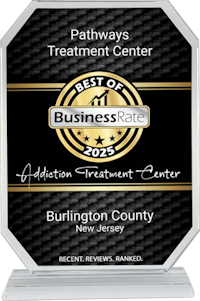Finding your footing after addiction treatment can feel overwhelming, but you’re not alone. Studies show that up to 60% of individuals in recovery may experience a relapse, often because the transition back to everyday life comes with stress and unexpected triggers.
That’s where sober living can make all the difference. At Pathways Treatment Center in Burlington, New Jersey, we specialize in providing the tools and support needed to thrive after treatment through outpatient programs, partial hospitalization, intensive outpatient care, and dual diagnosis services.
This guide will explore what sober living is really like and how it can help you build a solid foundation for long-term recovery. From learning to manage stress in a supportive environment to developing the skills to handle life’s ups and downs without substance use, sober living can offer a vital stepping stone to lasting wellness.
Sober living homes are transitional residences for individuals recovering from substance abuse. They serve as a bridge between rehabilitation facilities and independent living. These homes are designed to provide a safe and supportive environment where individuals can focus on their recovery.
Typically, sober living homes are gender-specific and may vary in size and structure. They often require residents to adhere to certain rules, such as maintaining sobriety, attending support meetings, and contributing to household responsibilities. This structure helps create a sense of accountability and community among residents.

How Sober Living Homes Work
Residents of sober living homes usually have some level of independence. They are expected to manage their daily activities (such as work, school, or therapy) while also participating in household meetings and chores. The goal is to help individuals develop life skills that will support long-term sobriety.
Most sober living homes operate on a “self-governed” model, meaning that residents help set the rules and expectations for the house. This collaborative approach fosters a sense of ownership and responsibility, which can be empowering for those in recovery.
Rules and Regulations
While each sober living home may have its own set of rules, some common regulations include:
- Zero tolerance for drugs and alcohol
- Regular drug testing
- Mandatory attendance at support group meetings, such as Alcoholics Anonymous or Narcotics Anonymous
- Participation in household chores and responsibilities
- Curfews and restrictions on visitors
These rules are in place to create a safe environment and promote recovery. Residents are encouraged to communicate openly about any challenges they face, which can help foster a supportive community.
The Benefits of Sober Living
Sober living homes offer numerous benefits that can significantly aid the recovery process. Beyond just a safe place to stay, sober living homes provide a supportive community, life skills development, and a structured environment.
One of the most significant advantages of sober living is the sense of community it fosters. Living with others who are also in recovery can help reduce feelings of isolation and loneliness. Residents often form strong bonds as they share their experiences, struggles, and successes.
This supportive environment encourages individuals to hold each other accountable and provides a network of encouragement. Many residents find that they can relate to one another in ways that friends and family may not understand, which can be incredibly validating.
Sober living homes often emphasize the importance of developing life skills. Residents may participate in workshops or group sessions focused on topics like budgeting, job searching, and communication skills. These skills are essential for successful reintegration into society.
By learning how to manage their time, finances, and relationships, individuals in sober living can build a strong foundation for their future. This preparation can significantly reduce the risk of relapse once they transition to independent living.
The structure provided by sober living homes is crucial for many individuals in recovery. Having a daily routine helps residents stay focused on their goals and maintain accountability. This structure often includes regular meetings, chores, and scheduled activities that promote a healthy lifestyle.
Additionally, house managers or counselors can provide guidance and support. These individuals are often in recovery themselves and can offer valuable insights and encouragement, making the transition smoother for residents.

What to Expect in Sober Living
Entering a sober living home can be a significant step in the recovery journey. Understanding what to expect can help ease anxiety or apprehension about the process. Here are some key aspects to consider when moving into a sober living home:
When first entering a sober living home, individuals may experience an adjustment period. This transition can be challenging as residents adapt to new routines and house dynamics. It’s normal to feel a mix of emotions, including excitement, fear, and uncertainty.
During this time, open communication with housemates and staff is essential. Sharing feelings and concerns can help foster a supportive environment and ease the transition. Many residents find comfort in knowing that others are experiencing similar challenges.
Daily life in a sober living home typically includes a structured schedule. Residents may start their day with morning meetings or check-ins, followed by chores and personal activities. Many homes encourage participation in local support groups, which can be a vital part of the recovery process.
Evenings might include group discussions, recreational activities, or personal time for reflection. This routine helps create a sense of normalcy and stability, which can be beneficial for those in recovery.
Building relationships with housemates can be one of the most rewarding aspects of sober living. Residents often share meals, participate in activities, and support one another through challenges. These connections can lead to lasting friendships that extend beyond the sober living experience. However, it’s essential to approach these relationships with caution. While forming bonds is important, maintaining personal boundaries and focusing on individual recovery goals should always be a priority.
The Role of Support Groups in Sober Living
Support groups play a crucial role in the sober living experience. Many sober living homes require residents to attend regular meetings, such as Alcoholics Anonymous (AA) or Narcotics Anonymous (NA). These groups provide a platform for individuals to share their experiences and learn from others.

Benefits of Support Groups
Support groups offer several benefits, including:
- Emotional support from peers who understand the challenges of recovery
- Opportunities to share personal experiences and learn from others
- Access to resources and information about recovery
- Encouragement to stay committed to sobriety
Many individuals find that attending support groups helps them feel less alone in their journey. The shared experiences can foster a sense of belonging and provide motivation to continue working towards recovery goals.
Finding the Right Group
Choosing the right support group is essential for a successful recovery experience. Residents should explore different groups to find one that resonates with their personal beliefs and experiences. Some may prefer traditional 12-step programs, while others might seek alternative recovery approaches.
It’s important to remember that recovery is a personal journey, and what works for one person may not work for another. Finding a supportive and understanding group can make a significant difference in the recovery process.
Challenges in Sober Living
While sober living offers many benefits, it is not without its challenges. Understanding these potential obstacles can help individuals prepare for the realities of life in a sober living home.
One of the most significant challenges in sober living is dealing with triggers and the risk of relapse. Triggers are situations, people, or environments that may provoke cravings for substances. Living in a sober environment can help reduce exposure to triggers, but they can still arise. Residents are encouraged to develop coping strategies to manage triggers effectively. This may include practicing mindfulness, engaging in physical activity, or reaching out to a support network for help.
Living with others can sometimes lead to conflicts. Differences in personalities, lifestyles, and recovery journeys can create tension among residents. It’s essential to approach conflicts with open communication and a willingness to compromise. Many sober living homes have established conflict resolution processes that encourage residents to address issues calmly and respectfully. Learning how to resolve conflicts in a healthy way is an important life skill that can benefit individuals long after they leave sober living.
While sober living provides a supportive environment, maintaining sobriety ultimately depends on the individual. Residents must remain committed to their recovery and actively engage in their healing process. This may include attending support meetings, participating in therapy, and practicing self-care.
Staying vigilant about sobriety can be challenging, especially when faced with external pressures or stressors. However, developing a strong support network and utilizing coping strategies can significantly enhance the chances of long-term success.
Begin Your Journey at Pathways Treatment Center
If you’re ready to take the next step towards a sober and fulfilling life, Pathways Treatment Center is here to guide you. Our compassionate team offers personalized substance abuse treatment options, including Intensive Outpatient (IOP), Partial Hospitalization (PHP), and outpatient treatment, as well as aftercare services like sober living.
We specialize in treating a variety of addictions, ensuring that your unique path to recovery is met with the understanding and specialized care you deserve. Contact us today to start on the path toward healing and reclaim the life you deserve.


